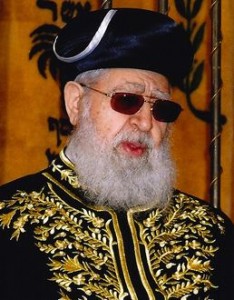Rabbi and Member of Knesset
Mazor Mahoy Bahaina (b. 1973) was born in the Ethiopian village of Welkite. As a child, he fled the country with his family on foot, heading for Israel. It took a year and a half, most of which was spent in Sudanese refugee camps, to finally reach the Promised Land. Bahaina enrolled in religious yeshivas for study, eventually making it to the prestigious Porat Yosef Yeshiva in Jerusalem. After earning his rabbinic ordination, he moved to Be’er Sheva to support the influx of Ethiopian Jewish immigrants, ultimately becoming the chief rabbi of the city’s 10,000 Ethiopian Jews. He also sat on the city’s council, which brought him into the political sphere. Bahaina eventually got on the list of Shas (“Shomrei Sefarad”, Israel’s religious Sephardic political party). He worked for the Ministry of Religious Affairs, and as an advisor to Israel’s Minister of Finance. In April 2008, Bahaina was given a seat in the Knesset, and served as a member of parliament until the following year. He was a member of the Labor, Welfare, and Health Committee, as well as the committee for children’s rights, among others. Though no longer in government, Bahaina continues to diligently serve Israel’s public, particularly the Ethiopian community, and is working to assist the remaining Jews of Ethiopia to make aliyah.
Words of the Week
Six million of us were murdered in the Holocaust. But instead of disappearing, we decided that after 2,000 years of exile, it would be better to go home and rebuild our own country. And so we did. What took other nations hundreds and hundreds of years to build, we did in only a few. What was possible we did very quickly, and what was impossible took us just a bit longer.
– Rabbi Dr. Nathan Lopes Cardozo


